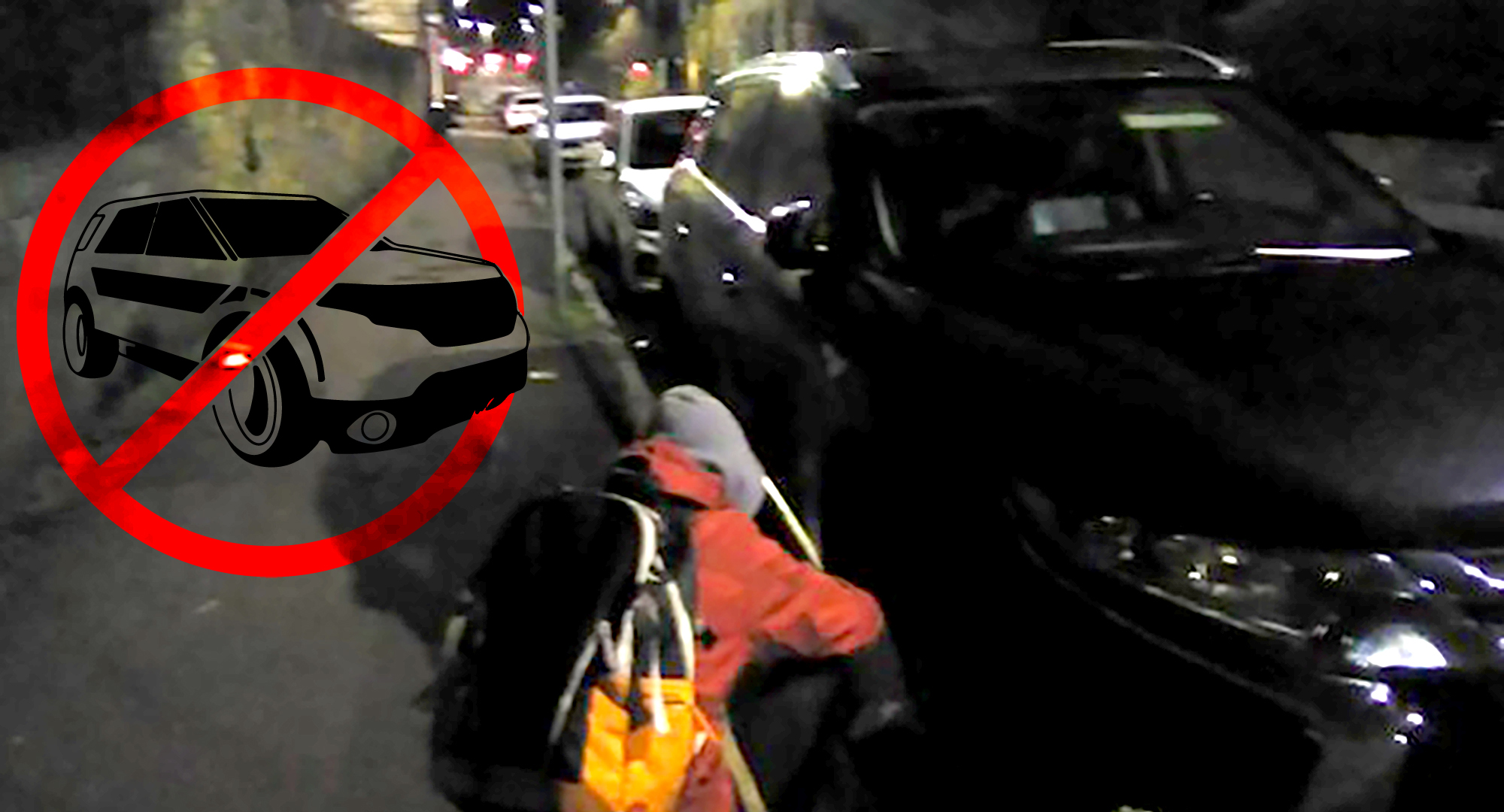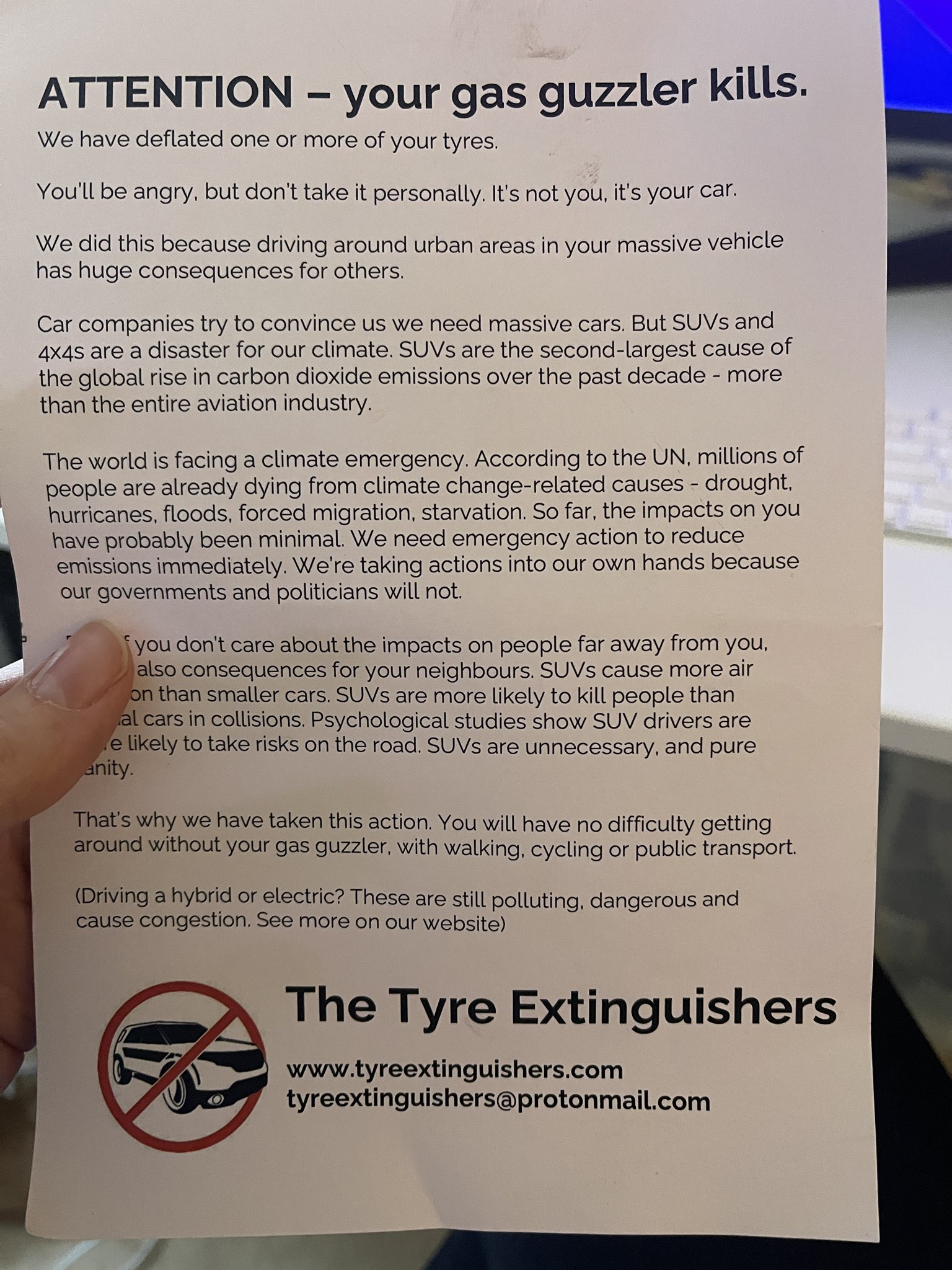As politicians dither on climate, activists ‘fight back’ by deflating SUVs
You walk out of your house on a sunny weekend morning, eager to drive your gasoline-powered sports utility vehicle (SUV) to the local beach. You’re about to turn on the engine and hit the road, when you notice a flier stuck underneath the windshield wiper.
“We have deflated one or more of your tires,” it reads. “You’ll be angry, but don’t take it personally. It’s not you, it’s your car…”
That’s the message from an anonymous collective called Tyre Extinguishers. Since March, the group has deflated the tires of nearly 6,500 SUVs in Austria, Canada, France, Germany, New Zealand, the Netherlands, Sweden, the UK and the US. Their goal? Drawing attention to gas-guzzling vehicles’ impact on climate change and air pollution.
If SUVs were an individual country, they would have ranked sixth in the world for emissions last year, accounting for more than 900 million tonnes of CO₂.
“We are aiming to grow this movement to the point where it becomes impossible to own an SUV in the world’s urban areas,” said a spokesperson for Tyre Extinguishers. “A relatively small number of people can make this happen.”
Tyre Extinguishers isn’t alone. As politicians dither on climate policy that matches what the science demands, some citizens are going beyond peaceful protests to make themselves heard.
In July, activists with the group Just Stop Oil glued themselves to frames of paintings in art galleries in the UK. They also breached the track on the first lap of the Formula 1 British Grand Prix. This month, the French group Derniere Renovation interrupted the Tour de France cycling race. Last year, the group Insulate Britain disrupted traffic across cities and highways in the UK.
These activist outfits are all building on tactics popularised by Extinction Rebellion (XR), which was founded in the UK in 2018 and now acts as an umbrella organisation for a variety of global groups.
In July, members of the group Doctors for XR broke glass at the London office of finance giant JPMorgan Chase & Co. In April, activists of Scientist Rebellion chained themselves to the doors of JPMorgan Chase’s office in Los Angeles.
Tyre Extinguishers say they currently have 50 groups worldwide, to whom they provide “inspiration” on their website in the form of images to identify SUVs, a video on how to deflate tires and pictures of the “It’s your car” leaflet in 10 languages.
The group’s ultimate aim is “to see bans on SUVs in urban areas, pollution levies to tax SUVs out of existence, and massive investment in free, comprehensive public transport”.
“But until politicians make this a reality, Tyre Extinguishers’ action will continue.” – Bloomberg
Glaciers vanishing at record rate in Alps following heatwaves
From the way 45-year-old Swiss glaciologist Andreas Linsbauer bounds over icy crevasses, you would never guess he was carrying 10kg of steel equipment needed to chart the decline of Switzerland’s glaciers.
Normally, he heads down this path on the massive Morteratsch Glacier in late September, the end of the summer melt season in the Alps. But exceptionally high ice loss this year has brought him to this 15-square-kilometre amphitheatre of ice two months early for emergency maintenance work.
The measuring poles he uses to track changes in the depth of the pack are at risk of dislodging entirely as the ice melts away and he needs to drill new holes.
The Alps’ glaciers are on track for their highest mass losses in at least 60 years of record-keeping, data shared exclusively with Reuters shows. By looking at the difference in how much snow fell in winter, and how much ice melts in summer, scientists can measure how much a glacier has shrunk in any given year.
Since last winter, which brought relatively little snowfall, the Alps have sweltered through two big early summer heatwaves – including one in July marked by temperatures near 30°C in the Swiss mountain village of Zermatt.
During this heatwave, the elevation at which water froze was measured at a record high of 5,184 metres – at an altitude higher than Mont Blanc’s – compared with the normal summer level of between 3,000-3,500 metres.
“It’s really obvious that this is an extreme season,” Linsbauer said.
Most of the world’s mountain glaciers — remnants of the last ice age — are retreating due to climate change. But those in the European Alps are especially vulnerable because they are smaller, with relatively little ice cover.
Meanwhile, temperatures in the Alps are warming at around 0.3°C per decade — around twice as fast as the global average.
If greenhouse gas emissions continue to rise, the Alps’ glaciers are expected to lose more than 80% of their current mass by 2100. Many will disappear, regardless of whatever emissions action is taken now, thanks to global warming baked in by past emissions, according to a 2019 report by the UN Intergovernmental Panel on Climate Change.
The dire situation this year raises concern that the Alps’ glaciers might vanish sooner than expected. With more years like 2022, that could happen, said Matthias Huss, who leads Glacier Monitoring Switzerland. – Reuters
Record temperatures, wildfires wreak havoc on Europe’s winemakers
In Portugal’s Douro Valley on 7 July, a wildfire burnt close to Oscar Quevedo’s Quinta da Alegria vineyard. By the middle of the night, flames surrounded it. The vines around the edges, amounting to about a hectare, burned. In his 39 years, Quevedo says, “I had never seen such a big and fast fire in the heart of the Douro.”
All over Europe, temperatures in wine regions have been sweltering at new highs, and heat waves are moving north into such normally cool countries as Germany.
In the UK, temperatures above 40°C were recorded for the first time.
Winemakers worry this will lower yields by 25% or more for this vintage. Many had already been slammed by early frost and hail. Increasingly intense heat waves are signalling that conditions could become even more extreme and unpredictable over time.
“Europe has been warming faster than the global average,” says Prof Angel Hsu, a climate scientist at University of North Carolina at Chapel Hill.
By now, wine lovers know how a mix of high temperatures, drought and gusty winds make it easy to spark a wildfire and hard to stop its spread.
Europe’s fire season came earlier than usual this year. Land has burned in France, Spain, Portugal and Greece, among others; thousands of people have been evacuated and many have died.
Even if a fire doesn’t burn vines, smoke from nearby flames can ruin crops for kilometres. When heavy smoke hangs over vines for days, it can cause smoke taint in the grapes, which gives wines an ashy taste. In the past, this has affected wines in Napa and Sonoma in California and in Australia.
Still, rural fires are affecting only some wine areas, while just about everywhere vineyards are suffering from extreme heat and ensuing drought. High temperatures that persist can sunburn grapes, which won’t ripen well, and also hydric stress, which deprives the vines of enough water to flourish. They react by accumulating sugar more slowly, which delays ripening and harvest. Grapes are smaller, yields drop, and quality suffers.
And summer 2022 isn’t over yet. – Bloomberg
A year on, China’s CO2 market yet to drive big emission cuts
China’s year-old carbon market has given more than 2,000 power plants a taste of emissions trading, but design flaws and data fraud have meant limited large-scale greenhouse gas reductions and environmental gains, experts say.
China’s much-heralded Emissions Trading Scheme (ETS) is already the world’s biggest, regulating around 4.5 billion tonnes of annual CO2 output from the power industry. Nearly 200 million tonnes of carbon changed hands in the first year of operations at a total value of 8.5-billion yuan (R21-billion).
However, trading has been relatively slow, dogged by a surplus of emissions allocations as well as concerns about data accuracy.
“In terms of the impact, in terms of environmental gains, clearly it’s been limited,” said Matt Gray, co-founder of TransitionZero, a climate think-tank.
Some of the criticism of the ETS is down to the scheme’s design. Emission allowances are handed out free of charge, and are determined not by absolute emission volumes but by industry efficiency benchmarks set at a relatively low bar.
Though environmental gains have been limited so far, China’s cautious approach was designed to gain experience and iron out any potential problems without overburdening its enterprises.
Other ETS, including the world’s second-largest in Europe, also took time to get established, but trading volumes have increased steadily since its launch in 2005. Think-tank Ember credits the scheme for cutting the continent’s coal power emissions by 43% from 2013 to 2019.
Liu Youbin, a spokesperson with the Ministry of Ecology and Environment (MEE), told a briefing that building the ETS was “complicated” and “still at an early stage”, and authorities would continue to make improvements.
Data accuracy has remained a major concern, with the MEE naming and shaming market players in March for tampering and forging test reports and other misdemeanours. Liu said the crackdown served as an effective deterrent.
But fraud remains one of the major challenges and China has yet to fully address it, according to Shawn He, a Beijing-based lawyer who advises firms on carbon compliance.
“It was a good move by the regulator,” said He. “But I’m afraid the penalties for such malpractices ... are too small to intimidate. I hope and expect that to change with new legislation to be adopted in the near future.”
China aims to expand the ETS into other industrial sectors as early as this year, with construction materials, steel and non-ferrous metals all preparing to join. That could pose even bigger challenges when it comes to data accuracy, said Gray.
“If you can’t get data right on power, then there’s no way you’ll get data right on heavy industry, because the heavy industry subsectors are just much more opaque,” he said.
Many of the problems facing China’s carbon market could be resolved quickly, but the government is unlikely to consider the issue a priority this year as it tries to guarantee energy supplies and rejuvenate an economy hit by Covid lockdowns, Gray added.
“I think it’s obvious that those will be the key priorities, and as a consequence, I think emissions trading could take a backseat in terms of how effective it is as a policy.” – Reuters




 (Photo: Twitter)
(Photo: Twitter) 